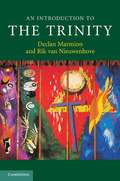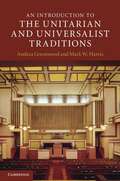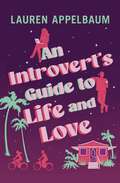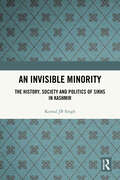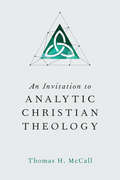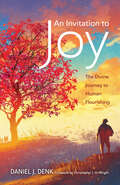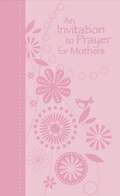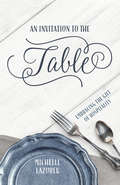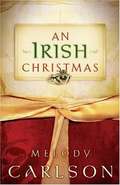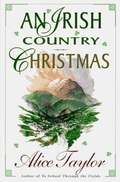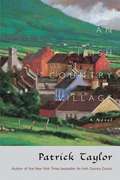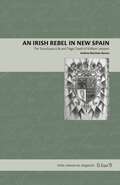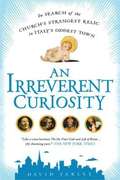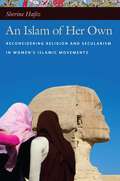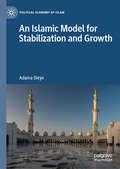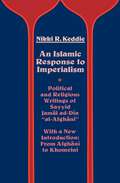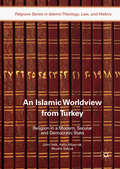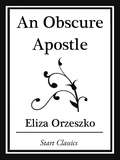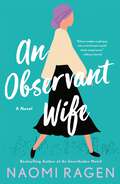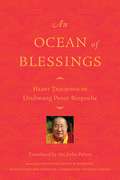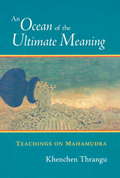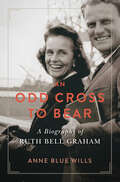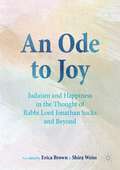- Table View
- List View
An Introduction to the Trinity
by Rik Van Nieuwenhove Declan MarmionOver the last decade there has been a resurgence of writing on the Trinity, indicating a renewal of ideas and debate concerning this key element of Christian theology. This introduction challenges the standard account of a decline and revival in Trinitarian theology, taking into account recent, alternative readings of the theological tradition by Lewis Ayres and Michel Barnes amongst other scholars. By clearly analysing the scope of these new approaches, the authors establish the importance of a considered understanding of the Trinity, resisting the notion of separating faith and reason and identifying theology's link to spirituality. Their account also eschews the easy stereotypes of Western Christianity's supposedly more Unitarian approach as opposed to the more Trinitarian view of the East. Offering an overview of the main people and themes in Trinitarian theology past and present, this book thus provides an accessible, comprehensive guide for students and scholars alike.
An Introduction to the Unitarian and Universalist Traditions
by Andrea Greenwood Mark W. HarrisHow is a free faith expressed, organised and governed? How are diverse spiritualities and theologies made compatible? What might a religion based in reason and democracy offer today's world? This book will help the reader to understand the contemporary liberal religion of Unitarian Universalism in a historical and global context. Andrea Greenwood and Mark W. Harris challenge the view that the Unitarianism of New England is indigenous and the point from which the religion spread. Relationships between Polish radicals and the English Dissenters existed and the English radicals profoundly influenced the Unitarianism of the nascent United States. Greenwood and Harris also explore the US identity as Unitarian Universalist since a 1961 merger and its current relationship to international congregations, particularly in the context of twentieth-century expansion into Asia.
An Introvert's Guide to Life and Love
by Lauren AppelbaumInheriting a seaside cottage comes with strings attached in this touching romance where an introverted remote worker must leave her city apartment and learn to connect with others—and find love—in real life. Mallory Rosen loves working from home—minimum contact with others suits her just fine. Nothing could make her leave her comfortable Seattle apartment. Until she inherits her late grandmother&’s seaside cottage . . . with strings attached: Take care of your grandfather. Fine. She can quickly check on Gramps, rent out the cottage, and return to her life. Yet when she arrives at the independent living community, the WiFi keeps dropping, Gramps interrupts her meetings, and the cottage needs renovating—according to the handsome, extroverted property manager. So much for grand plans. Soon Mal finds herself caught up in senior citizen aerobics, new friendships, nightly chats with Gramps—and in the sparks flying with her charming property manager. Then, just when her new life and chance at love feel worth leaving her safety net behind, she gets the worst notice ever: All employees must return to the office.
An Invisible Minority: The History, Society and Politics of Sikhs in Kashmir
by Komal JB SinghThis book presents a groundbreaking study of the Kashmiri Sikh community, examining how identities are formed and negotiated across the intersections of religion, region, and nation. Combining deep ethnographic engagement with historical analysis, it examines Kashmir beyond the hegemonic boundaries of the Hindu-Muslim binary, by foregrounding an alternative discourse to see how majority–minority relations in a volatile region like Kashmir unfold, how the Sikh minority within the minorities is silenced in everyday discourses, and how all minorities are pushed to the margins. The author studies the themes of alienation, moments of solidarity, and cooperation between the various communities in Kashmir. This book traces the rich and often untold history of Sikhs in Kashmir from the visits of various Gurus, Maharaja Ranjit Singh rule to Singh Sabha Movement. It explores the traumatic history of partition, 1984 violence to Chittisinghpora Massacre. Thus, it traces a journey of faith, reform, and resilience.Numerically, Sikhs presently are the largest minority community living in Kashmir presently and therefore, crucial to any understanding of Kashmir. The book will be of use to students and researchers of history, Sikh studies, sociology, religion, minority studies, anthropology, and South Asian studies.
An Invitation to Analytic Christian Theology
by Thomas H. McCallIn recent decades a new movement has arisen, bringing the conceptual tools of analytic philosophy to bear on theological reflection. Called analytic theology, it seeks to bring a clarity of thought and a disciplined use of logic to the work of constructive Christian theology. In this introduction to analytic theology for specialists and nonspecialists alike, Thomas McCall lays out what it is and what it isn't. The goal of this growing and energetic field is not the removal of all mystery in theology. At the same time, it insists that mystery must not be confused with logical incoherence. McCall explains the connections of analytic theology to Scripture, Christian tradition and culture, using case studies to illuminate his discussion. Beyond mere description, McCall calls the discipline to a deeper engagement with the traditional resources of the theological task.
An Invitation to Joy: The Divine Journey to Human Flourishing
by Daniel J. DenkJesus came to bring joy to the world. What happened?In a world full of suffering, the declaration that God wants us to be joyful can sound tone-deaf at best or hypocritical at worst. In An Invitation to Joy, Daniel J. Denk invites readers to cast off hopelessness and rediscover joy. Yet, as Denk reminds us, &“we don&’t find joy by pursuing joy; we find it by pursuing something else,&” namely, the kingdom of God. This joy is not naive optimism but a profound sense of purpose and peace. Throughout his reflections, Denk approaches the topic of Christian joy with sensitivity and nuance, supporting his argument with Scripture and theological scholarship. But An Invitation to Joy is not primarily academic—Denk is just as likely to share his personal experience or his favorite passages from Lord of the Rings, all in an easy manner akin to a friendly conversation over coffee. Life-affirming, empathetic, and, above all, joyful, An Invitation to Joy is a salve for the wounds of the world-weary. If you have lost your joy, this book will help you find it again.
An Invitation to Prayer for Mothers
by Jack CountrymanBeautifully illustrated book with scriptures and prayers arranged topically to inspire, equip, and help mothers grow in their walk with the Lord and their calling of motherhood. This book has been priced affordably and makes a great gift for Mother's Day, birthday or as a presentation to new mothers on the birth of their child.
An Invitation to the Table: Embracing the Gift of Hospitality
by Michelle LazurekJesus spent a chunk of his ministry eating and drinking with the "sinners and tax collectors" of the world. If we strive to be more like Jesus, shouldn't we do more of what he did?Hospitality involves more than the domesticated event we have grown accustomed to practicing. It is an embodiment of all the Christian life stands for: a gesture of love, opening up our hearts and lives, and sacrificing luxury and security for the chance to display God's glory. To receive hospitality from others is an invitation to receive God's transformative power to work in their lives.Readers will ask themselves these questions:* What is hospitality? * Is it something I am, or something I do? * How do I offer my life as a gesture of hospitality? * What are some practical ways for me to display and receive hospitality?
An Irish Christmas
by Melody CarlsonA Captivating Story of Love, Deception, and Secret Passions. A WELL-HIDDEN SECRET has haunted Colleen for twenty years. Her husband made her promise she would never speak of it again; but now he's gone and life seems so out of control. Will her fragile relationship with her adult son Jamie survive the truth she's hidden for so long? Jamie has a few secrets of his own--like his desire to pursue his music. But as with many things in his life, it isn't going very well. Why doesn't it seem to fit in anywhere? When Jamie announces his plans to join the military, Colleen decides it's time for the two of them to take a trip together--to Ireland. But will this trip cost her the very relationship she's trying to save? The truth they discover could change their lives in a way neither ever thought possible. This will be a Christmas they will never forget.
An Irish Country Christmas
by Alice TaylorIn this holiday gift edition, Alice Taylor returns to share the warm glow of a child's Yuletide celebration. Her tales of the season and the Irish countryside sparkle with magic. [From The inside dust jacket Flaps:] "The magic of Christmas was out in the moonlit haggard with the cattle and down the fields with the sheep but most of all it was here in the holly-filled kitchen with the little battered crib under the tree and the tall candle lighting in the window. The candle was the light of Christmas and the key that opened the door into the holy night." Beloved by readers on both sides of the Atlantic for her warmly remembered tales of Irish childhood, Alice Taylor now returns to reacquaint us with the joyful glow of a child’s Yuletide celebration in An Irish Country Christmas. In these pages she conveys, as no other author can, the delight that lies in every detail of the festive season for a young child. Her Irish countryside is like an archetype of everyone’s ideal Christmas landscape: a world where the season came with holly bundles and real geese to capture for the holiday dinner. Most of all, her storytelling reminds us of the unsentimental, wondrous innocence of youth, where every snow-dusted corner holds a surprise, and the lighting of the Christmas candle marks the commencement of magic. If Charles Dickens had written from rural Ireland instead of
An Irish Country Village (Irish Country, Book #2)
by Patrick TaylorYoung Doctor Barry Laverty has only just begun his assistantship under his eccentric mentor, Dr. Fingal Flahertie O'Reilly, but he already feels right at home in Ballybucklebo. When the sudden death of a patient casts a cloud over Barry's reputation, his chances of establishing himself in the village are endangered, especially since the grieving widow is threatening a lawsuit. While he anxiously waits for the postmortem results that he prays will exonerate him, Barry must regain the trust of the gossipy Ulster village, one patient at a time. From a put-upon shop girl with a mysterious rash to the troubled pregnancy of a winsome young lass who's not quite married yet, Ballybucklebo provides plenty of cases to keep the two country G.P.s busy. Not all their challenges are medical in nature. When a greedy developer sets his sights on the very heart of the community, the village pub, it's up to the doctors to save the Black Swan (affectionately known to the locals as the 'Mucky Duck') from being turned into an overpriced tourist trap. After all, the good citizens of Ballybucklebo need some place to drink to each other's health. . .
An Irish Rebel in New Spain: The Tumultuous Life and Tragic Death of William Lamport (Latin American Originals #17)
by Andrea Martínez BaracsAn Irish Rebel in New Spain recounts the story of the so-called Irish Zorro, who, in 1659, was burned at the stake for conspiring against the empire to make himself king of Mexico, restore the privileges of the Indigenous people, end the persecution of the Jews, and free the African slaves.William Lamport was an Irish rebel, a soldier, a poet, and a thinker. His Catholic family lost their land and their religious freedom after the English conquest of Ireland. In 1640, Lamport emigrated to New Spain, where he witnessed the abuses of the colonial system and later ran afoul of the Mexican Inquisition. Imprisoned in 1642, Lamport argued his own defense as well as that of the Jews who were in prison with him. Along with a concise biography, this volume provides an anthology of Lamport’s most representative writings: his detailed project for a Spanish-supported Irish insurrection; a manifesto and plan for a Mexican uprising against Spain; his self-defense, which he nailed to the doors of the cathedral when he managed to momentarily escape from prison; a selection of his poetry; and the court documents about the accusation that led him to the pyre.This concise, compelling, and original reflection on the systems of (in)justice in seventeenth-century Mexico is designed for classes on early modern Spain, colonial Latin America, and the Inquisition. Those with an affinity for Irish history will also enjoy learning about the colorful life of William Lamport.
An Irish Rebel in New Spain: The Tumultuous Life and Tragic Death of William Lamport (Latin American Originals)
by Andrea Martínez BaracsAn Irish Rebel in New Spain recounts the story of the so-called Irish Zorro, who, in 1659, was burned at the stake for conspiring against the empire to make himself king of Mexico, restore the privileges of the Indigenous people, end the persecution of the Jews, and free the African slaves.William Lamport was an Irish rebel, a soldier, a poet, and a thinker. His Catholic family lost their land and their religious freedom after the English conquest of Ireland. In 1640, Lamport emigrated to New Spain, where he witnessed the abuses of the colonial system and later ran afoul of the Mexican Inquisition. Imprisoned in 1642, Lamport argued his own defense as well as that of the Jews who were in prison with him. Along with a concise biography, this volume provides an anthology of Lamport’s most representative writings: his detailed project for a Spanish-supported Irish insurrection; a manifesto and plan for a Mexican uprising against Spain; his self-defense, which he nailed to the doors of the cathedral when he managed to momentarily escape from prison; a selection of his poetry; and the court documents about the accusation that led him to the pyre.This concise, compelling, and original reflection on the systems of (in)justice in seventeenth-century Mexico is designed for classes on early modern Spain, colonial Latin America, and the Inquisition. Those with an affinity for Irish history will also enjoy learning about the colorful life of William Lamport.
An Irreverent Curiosity
by David FarleyA tour through the centuries and through a bizarre Italian town in search of an unbelievable relic: the foreskin of Jesus Christ In December 1983, a priest in the Italian hill town of Calcata shared shocking news with his congregation: The pride of their town, the foreskin of Jesus, had been stolen. Some postulated that it had been stolen by Satanists. Some said the priest himself was to blame. Some even pointed their fingers at the Vatican. In 2006, travel writer David Farley moved to Calcata, determined to find the missing foreskin, or at least find out the truth behind its disappearance. Farley recounts how the relic passed from Charlemagne to the papacy to a marauding sixteenth-century German solider before finally ending up in Calcata, where miracles occurred that made the sleepy town a major pilgrimage destination. Over the centuries, as Catholic theology evolved, the relic came to be viewed as something of an embarrassment, culminating in a 1900 Church decree that allowed the parish to display it only on New Year's Day. An Irreverent Curiosityinterweaves this history with the curious landscape of Calcata, a beautiful and untouched medieval village set atop four-hundred-fifty-foot cliffs, which now, due to the inscrutable machinations of Italian bureaucracy, is a veritable counterculture coven. Blending history, travel, and perhaps the oddest story in Christian lore, An Irreverent Curiosityis a weird and wonderful tale of conspiracy and misadventure.
An Islam of Her Own: Reconsidering Religion and Secularism in Women’s Islamic Movements
by Sherine HafezAs the world grapples with issues of religious fanaticism, extremist politics, and rampant violence that seek justification in either “religious” or “secular” discourses, women who claim Islam as a vehicle for individual and social change are often either regarded as pious subjects who subscribe to an ideology that denies them many modern freedoms, or as feminist subjects who seek empowerment only through rejecting religion and adopting secularist discourses. Such assumptions emerge from a common trend in the literature to categorize the ‘secular’ and the ‘religious’ as polarizing categories, which in turn mitigates the identities, experiences and actions of women in Islamic societies. Yet in actuality Muslim women whose activism is grounded in Islam draw equally on principles associated with secularism.In An Islam of Her Own, Sherine Hafez focuses on women’s Islamic activism in Egypt to challenge these binary representations of religious versus secular subjectivities. Drawing on six non-consecutive years of ethnographic fieldwork within a women's Islamic movement in Cairo, Hafez analyzes the ways in which women who participate in Islamic activism narrate their selfhood, articulate their desires, and embody discourses in which the boundaries are blurred between the religious and the secular.
An Islamic Model for Stabilization and Growth (Political Economy of Islam)
by Adama DieyeThis book argues that the macroeconomic policy adjustment models recommended by the IMF and the World Bank for implementation in many Muslim countries, with substantial donor financial support, have not been effective. Economic indicators show low economic growth, persistent fiscal and external deficits and limited industrialization. Also, these countries are experiencing increases in unemployment, poverty and substantial growth in income and wealth inequalities. These facts underline an urgent need to produce an alternative to the failed conventional macroeconomic model in order to address the challenge of macroeconomic and social adjustment policies. The project posits and investigates the idea that the Islamic economic model prescribed in the Quran and applied by the Prophet (sawa) could be the ideal model for Muslim as well as non-Muslim countries.
An Islamic Response to Imperialism: Political and Religious Writings of Sayyid Jamal ad-Din "al-Afghani" (Near Eastern Center, UCLA #21)
by Nikki R. Keddie"Keddie has rendered a valuable service ... Afghani merits the attention of Western students of the contemporary international scene and the Muslim renaissance since he made the first significant attempt to answer the modern Western challenge to the Muslim world." ---Eastern World "Sayyid Jamal ad-Din al-Afghani (1838-1897), the well known religious reformer and political activist, led a busy and complex life full of obscure and clandestine ventures. . . . [Keddie] draws on a wide range of primary and secondary sources. In part I an attempt is made to provide an accurate biography and a consistent analysis of Afghani. Part II co ntains translations of some of his most important writings. . . Although Afghani was concerned with the wide ranging need for Islamic reform, he devoted most of his life to the more urgent political problems confronting Muslims--problems arising out of their weakness in dealing with the Western Christian powers. Hence the tide of this book. The picture that emerges here confirms Afghani's long standing reputation as a defender of Muslim interests--not against borrowing European advances in science and technology, but against foreign political, economic, or military encroachment."--Middle East journal "Jamal ad-Din was a mysterious figure and most of the mysteries were of his own making . . . it has been left to Professor Keddie to apply the methods of the critical historian to the matter ... This book shows how successful she has been . . . there has emerged for the first time a credible picture of Jamal ad-Din's life . . . The second part contains translations of works by Jamal ad-Din himself, and these are valuable because most of them were written in Persian and have either not been easily available at all or else have been available only in Arabic translation. This is particularly true of the Refutation of the Materialists. "--International journal of Middle East Studies "For the first time a significant collection of the writings of al-Afghani are now available in English, and so, for the first time, this controversial figure has had more life breathed into him."--American Historical Review
An Islamic Worldview from Turkey: Religion in a Modern, Secular and Democratic State (Palgrave Series in Islamic Theology, Law, and History)
by John Valk Halis Albayrak Mualla SelçukThis book is a journey into the heart of an Islamic worldview. It asks challenging questions of far-reaching consequence, addressing matters such as the Qur'an and revelation; rituals and symbols embraced; nature of God, of humans, and of our knowing; dignity of the human, sacredness of life, and more. It precludes easy, prescribed answers, preferring instead thoughtful reflection on two basic questions: What does it mean to love God? What does it mean to be a good person? Carefully crafted responses are presented by a group of scholars from Qur'an Studies, Worldview Studies, Women's Studies, Cultural Studies and Religious Education. It uncovers a dynamic understanding of Islam; one that meets challenges of the present, counters harsh criticisms, and breathes new life into a rich and longstanding tradition that continues to impact the lives of billions of people around the world.
An Obscure Apostle (Start Classics)
by Eliza OrzeszkoA fantastic 'dramatic story' from Polish novelist Eliza Orzeszkowa, one of several works she wrote about the social conditions of Poland in the late 19th century.
An Observant Wife: A Novel
by Naomi RagenIn this rich and compassionate novel, An Observant Wife, Naomi Ragen continues the love story between newly observant California-girl Leah and ultra-Orthodox widower Yaakov from An Unorthodox Match.From the joy of their wedding day surrounded by supportive friends and family, Yaakov and Leah are soon plunged into the complex reality of their new lives together as Yaakov leaves his beloved yeshiva to work in the city, and Leah confronts the often agonizing restrictions imposed by religious laws governing even the most intimate moments of their married lives. Adding to their difficulties is the hostility of some in the community who continue to view Leah as a dangerous interloper, questioning her sincerity and adherence to religious laws and spreading outrageous rumors. In the midst of their heartfelt attempts to reach a balance between their human needs and their spiritual obligations, the discovery of a secret, forbidden relationship between troubled teenage daughter Shaindele and a local boy precipitates a maelstrom of life-changing consequences for all.
An Ocean of Blessings: Heart Teachings of Drubwang Penor Rinpoche
by Penor Rinpoche Ani Jinba PalmoThe first published collection of essential teachings by Penor Rinpoche, one of the most important Buddhist masters of the 20th century.This inspiring work is the first available collection of teachings by one of the most well-known Nyingmapa masters of the twentieth century, His Holiness Penor Rinpoche. Ani Jinba Palmo compiled and translated this valuable collection of Penor Rinpoche’s fundamental instructions for practitioners on the Vajrayana path. Coming straight from the heart and realization of this great master, these honest and clear teachings emphasize the indispensable foundations of loving-kindness, mindfulness, and simplicity needed to become a true yogi. Profound yet accessible, this work serves to remind Buddhist practitioners of the heart of the Tantric and Dzogchen traditions.
An Ocean of the Ultimate Meaning: Teachings on Mahamudra
by Khenchen ThranguIn this new book, Khenchen Thrangu provides an exhaustive commentary on the longest and most comprehensive of the three classic treatises on Mahamudra composed by the sixteenth-century scholar Wangchuk Dorje, the Ninth Karmapa. Khenchen Thrangu's teachings encompass the entire path of Mahamudra, including the preliminaries, the main practice, removing obstacles, and attaining the result of buddhahood--with detailed instruction in tranquility and insight meditation. This is the only available volume that presents Khenchen Thrangu's detailed commentary on this entire text.
An October Bride (A Year of Weddings Novella)
by Katie GanshertWhat if the only way you could make your father&’s last wish come true . . . was to marry the man of your dreams?Emma Tate has just moved on from one fiancé, so when she announces a sudden engagement to her lifelong buddy Jake Sawyer, every busybody in Mayfair goes into high alert. Of course, no one but Jake and Emma know the real reason they&’re getting married—so Emma&’s dying father will have a chance to walk her down the aisle.But while Jake and Emma move forward with their plan—and frantically plan an October wedding—it becomes clear that their agreement has a few complications . . . the biggest being their true feelings for each other.With dubious friends, deliriously thrilled parents, and a town that won&’t keep its nose out of their business, Emma and Jake will have a lot to contend with if they&’re going to pull this off. The real question is: Who wants this wedding more, Emma&’s dad . . . or Emma?
An Odd Cross to Bear: A Biography of Ruth Bell Graham (Library of Religious Biography (LRB))
by Anne Blue WillsThe fascinating life story, told critically but sympathetically, of a paragon of twentieth-century white Christian womanhood—and the wife of evangelist Billy Graham.Ruth Bell Graham&’s legacy is closely associated with that of her husband, whose career placed her in the public eye throughout her life. But, while it&’s true that her identity was significantly shaped by her role in supporting Billy Graham&’s ministry, Ruth carried a strong sense of her own agency and was widely influential in her own right, especially in the image she projected of conservative evangelical womanhood—defined by a faith that was deep, private, and nonpolitical. Beginning prior to Ruth and Billy&’s meeting at Wheaton College, Anne Blue Wills chronicles the many formative experiences of Ruth&’s life—especially the first decade of her childhood living in a community of American medical missionaries in China. Throughout the biography, Wills focuses not on Ruth&’s role in Billy&’s life, but on her own interests, ambitions, and fears—as a devoted mother of five, as the fastidious manager of a household, as a devout and well-read Christian, and as a beloved writer and poet. Dealing honestly with a life of contradictory responsibilities that Ruth Bell Graham herself called &“an odd kind of cross to bear,&” Wills draws from nearly a decade of original research and presents a nuanced portrait of Graham apart from the reverential awe of her admirers and the oversimplified caricatures put forth by her detractors. In telling Graham&’s story, Wills indirectly tells the story of millions of women who emulated Graham as a role model—women who spurned second-wave feminism and willingly submitted to patriarchy while maintaining an undeniable sense of independence and strength of conviction.
An Ode to Joy: Judaism and Happiness in the Thought of Rabbi Lord Jonathan Sacks and Beyond
by Erica Brown Shira WeissBefore his rather sudden passing in 2020, Rabbi Lord Jonathan Sacks was one of the most eloquent and influential religious leaders of the generation. As Chief Rabbi of the United Hebrew Congregations of the Commonwealth for over two decades, he offered a universal message cultivated from the Jewish and Western cannons he knew so well. One concept that figured prominently in his work was joy. “I think of Judaism as an ode to joy,” he once wrote. “Like Beethoven, Jews have known suffering, isolation, hardship, and rejection, yet they never lacked the religious courage to rejoice.” In this volume, organized by the Rabbi Lord Jonathan Sacks-Herenstein Center for Values and Leadership, academics and writers explore the significance of joy within the Jewish tradition. These essays and reflections discuss traditional Jewish primary sources, including Biblical, Rabbinic and Hebrew literature, Jewish history and philosophy, education, the arts, and positive psychology, and of course, through the prism of Lord Sacks’ work.
